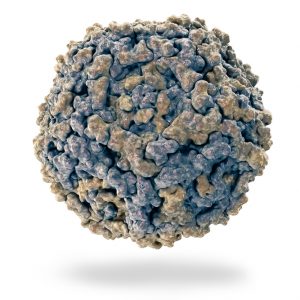Parvovirus
For most healthy people, parvovirus B19 infection causes a mild, self-limiting illness which is followed by life-long immunity. Infection is common in developed countries, where approximately 15% of pre-school children, 50% of adults, and 85% of elderly people show evidence of past infection.
The Native Antigen Company offers recombinant Parvovirus virus-like particles, expressing VP2 antigen in support of research into parvovirus biology and infection.
Parvovirus Background
Parvovirus B19 (B19V) is a small, non-enveloped, single-stranded DNA virus. Parvovirus belongs to the genus Erythroparvovirus within the Parvovirinae subfamily and is a member of the Parvoviridae family of viruses. B19V is highly infectious and is commonly transmitted between humans via infected respiratory secretions. The virus can also be transmitted through B19V infected blood products, transplant material, and from mother-to-foetus during pregnancy (CDC).
B19V infection commonly occurs in childhood, but can occur in some adults that have not been previously exposed to the virus. In healthy individuals, B19V causes erythema infectiosum, a typically mild disease, also known as ‘fifth disease’. The disease is characterised by a facial rash, which can later appear on the trunk and limbs, and is associated with mild fever and cold-like symptoms. In some adult cases, patients may present with joint pain and swelling that can continue for several months. Other symptoms of B19V infection include anaemia in immunocompromised patients, and a transient decrease in erythropoiesis in cases of sickle-cell anaemia (Rogo, LD. et al).
Diagnosis of B19V infection is generally performed using enzyme-linked immunosorbent assays, or ELISAs, to detect B19V-specific IgM or IgG antibodies in patient sera. Currently, there is no licenced vaccine available or specific antiviral therapy for the treatment of B19V infection.
References
- Centers for disease control and prevention: Parvovirus and Fifth disease
- Rogo, LD et. al. (2014). Human parvovirus B19: a review. Acta Virol.58:199-213.
Parvovirus Antigens
Parvovirus VP2 protein is a unique reagent that has been developed in response to the need for a highly pure and correctly assembled parvovirus antigen.
Parvovirus VP2 is produced in the form of virus-like particles (VLP) in human cell lines using state-of-the-art expression techniques. Concentration and purification are then performed by a series of ultracentrifuge and precipitation methods, which result in VLPs of exceptional quality and purity.
Questions?
Check out our FAQ section for answers to the most frequently asked questions about our website and company.

